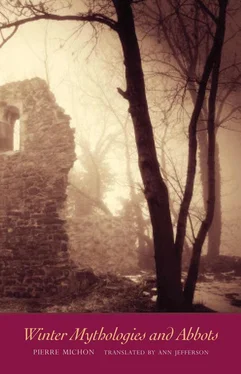Sometimes with exasperation, at other times with enjoyment, but always with pride because the glory will redound to him, Èble follows the summer’s work from higher up. He sits on the fortifications, his legs dangling over the marsh, or else he stands and makes the sign of salvation over all the bustle. He can see that the brothers have indeed read their Pliny or their Augustine, unless they are thinking of Moses when he parted the waters or are just adapting their hands marvelously to the decrees of their minds. Their method is simple. Starting from the edge of the little island the natives mark out a plot of two or three acres; they surround it with planks of wood so that a man can touch bottom. From this wooden deck the natives dig a deep ditch and pile up the earth to form an embankment; inside the plot, the women and children dig another ditch against the embankment, building it up further, stamping it down, beating it, making it firm. Èble loves to see the two feet of marble beating the mud, the same feet which each day beat the empty air in pleasure, raised and cleansed by the bolt of blue lightning. After two weeks it is possible to walk without fear on the plot, in three it is dry. By September four plots have been disentangled from the waters. Laughing, praying, rejoicing, Èble puts on his abbot’s miter and comes down to plant his crozier. It remains upright, it stands in earth. Fifteen male voices sing out, the natives kneel.
In the evening, when the husband has gone to put out the creels, when wordlessly she bares herself from feet to waist, the fire is wetter and burns hotter: she has seen the miter, she has seen the crozier, and it is the miter and the crozier that she has behind her closed eyes, between her raised feet. The bolt that shatters her is a man’s member but the glory is of an abbot. Èble sleeps content; he dreams that the little thuribulers from the past in Limoges, God’s little dancers with their dancing dishes, the incense for the bishop, the breath of God are huge, utterly naked women.
The rest are working twice as hard. The monks have decided on large, very heavy plows, with long broad plowshares, for six oxen and four men: they need to dig deep, beneath the lighter pink and gray surface silt, the green, to reach the blue silt beneath which is fat and heavy, and then to mix these different colors together. And for these huge plows the furnace in the forge never goes out, either by night or by day; the iron is beaten at nighttime, dipped red-hot into water, where it cries out, wedded with tremendous force to great pieces of oak to form the plowshares, and the fresh young oak burns and shrieks. Each night before Compline, Èble goes outside, walks to the hut or not, depending on whether the husband is away fishing or not, but each night he sits in the meadow to enjoy the orgies of sparks, the loud cries emitted by the iron as it submits. He thinks about his brother. He thinks about the love that his brother had for iron when it is mastered to the point where it molds itself to a man’s body as closely as wool, or when it is allowed its ferrous freedom, when you thrust it through the body of another man and it emerges dripping on the other side. This kind of iron is glory; it’s like the silk on a miter and the gold on a crozier. He lifts his head; the stars tell of another glory — the gold and the iron of God which stamp the dark night. Once, when he is absorbed in this heavenly reverie, Hugues soundlessly sits down nearby and looks at him. The sheaves of sparks light up the tow of his hair here and there, turning it to gold. Hugues passionately wants to kiss the tow, and also to rip it off. Èble leaves the stars, sees Hugues sitting there. Hugues has told him in confession that he too makes the feet of marble rise from the ground. He loves Hugues, who knows the books and reads them in a throbbing voice; and he would also like to thrust thirty inches of iron through Hugues’s young body. For a long while they remain silent, each thinking to himself about the two feet raised above the other man. The shriek from a wheel of fresh wood being strangled in a ring of red-hot iron by the cartwright soothes them both. They talk about the blacksmith brother who is a colossus, about his violent character which is nonetheless contained, about the rule of Saint Benedict beneath which monks groan but are purified and hardened, like iron in the furnace. Hugues observes that the rule speaks of gold, not iron. And that it is in gold that glory is visible, not iron. Èble remains silent for a long time, then he suddenly asks Hugues what glory is. He asks if it’s power. If it’s a name that echoes for centuries in the memory of men. If it’s for God alone, brilliant and brief, like the blue lightning bolt in the hut, or interminable and lost in the air, like reading, or like singing. If it’s fixed like the stars, or wayward like the sparks. If it’s pure. He asks if it can be mixed — with matter, with ambition, with the body of a living man. He asks derisively if draining twenty acres of land taken from the Chaos and the Void is glory. He falls silent. Hugues does not pause to reflect; he’s a young clerk with hollow cheeks who throbs, who knows, and who wants. He says, “Matthew says that Jesus says, Ye are the light of the world. Neither do men light a candle, and put it under a bushel, but on a candlestick; and it giveth light unto all that are in the house. Let your light so shine before men .” He adds that glory is good and honest like gold; it’s flagrant and visible; it’s a miter, it’s fire, it’s the cloak of Saint Martin — and all this must be shown to men. It’s ten acres of land reclaimed from the marsh because a mitered man willed it, because twenty men in black and fifty fishermen created it. He hesitates; he looks away from the abbot and says in a less confident voice that the devil can make use of glory, that it was glory he showed to Jesus when he took him to the mountain. Then they hear movement between the dormitory and the choir; they get up, they go to sing the Vigil. Èble thinks about David, about Bathsheba, about Uriah the Hittite.

At the end of September, Èble blesses the plows. There’s no time to lose; the rains are coming. Ten gigantic plows, ten war machines with handles as long as a lance and as broad as a thigh, and six oxen fettered, two by two, to the shaft. Èble is croziered and mitered in the early dawn. He can see them from above on the new land, like ten catapults erect and pointing at Saint-Michel. He walks down; he makes the sign of salvation over these diabolical machines and the horned herd. All at once the men shout, the oxen move off, and the machines follow; the earth opens; red and black are mixed: one monk by the shaft, four fishermen taking turns and propped along the handles. At the due hour the monks climb back up the little island and go to sing; the natives guide the oxen and maintain the furrow on their own. The chants fall like dew from above onto the sweat and the shouting, the panicked muzzles of the oxen, the earth that is shifted and laid bare. The fishermen eventually know the chants, take them up down below. The children run and dance along the plowshares, day after day.
One morning before Lauds, as the autumn drizzle is setting in and the plowing is coming to an end, an equipage arrives on two barges, with men-at-arms and an imposing figure who seems to be wearing a squirrel-fur hood, but it’s hard to be sure: day has scarcely broken. The lookout brother goes to fetch the abbot, and leaning against the outer wall beneath their black hoods the two men scrutinize and speculate, say that it must be this person, or rather that. The barges dock, the imposing figure stands up in an agile movement, and the moment he sets foot on the first step the abbot recognizes him: it’s Benoît, who was like a son to Èble in the days of incense and the purple ring, and whom he named coadjutor at Saint-Hilaire in Poitiers. Today he’s the one who wears the purple ring on his finger. He has come in person. He’s taller than Èble. Beneath the squirrel fur he looks a little like Hugues, but his skin is not as dark, his cheeks not as hollow. On the terrace in the drizzle he kisses the abbot’s hands, they embrace, and he says, “Your brother Guillaume is dead, and before he passed away he asked us to convey his farewells to you.” No, he did not die by iron; he too was tired, he’d thrown in his hand, he drew his last breath at the monastery of Saint-Cyprien, surrounded by orisons. They embrace once more, black hood alongside gray hood they walk to and fro, Benoît talks about the departed warrior, about the other men of fire: Foulque who now controls Anjou, little Hugues Capet who controls France and whose teeth are long. Èble isn’t really listening to these tales of secular matters which no longer concern him; his thoughts are wandering. He looks at little Benoît who served mass for him and who wears the purple ring; he thinks about Hugues, who is the same age as Benoît, about the sons he never had, and about the iron Guillaume used to brandish at every turn: when he was drunk, when he was joshing, when he was choked with anger. He weeps for Guillaume from the bottom of his heart, but there is something in his tears that gladdens him like wine. The sun is fully up now. The fishermen are walking down to the reclaimed plots with the oxen. Together they look at the war machines that require twenty arms to lift the shaft and yoke the oxen. Benoît remarks that the oxen in the third team are exhausted, and the lead ox is jerking its head the way they do when they’re about to turn nasty. The bishop retires to sleep, the abbot in the chapter house distributes the tasks for the day. For the shaft of the third team he picks Hugues.
Читать дальше












